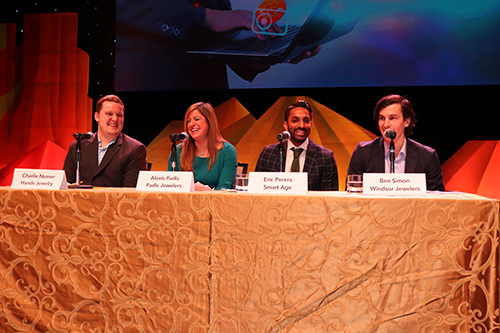Articles and News
The Minds Of Millennials, Part Two: Online Reviews, Selling Tips, And More | February 27, 2019 (1 comment)

Scottsdale, AZ—Whether it’s trying to sell to them or manage them, Millennials confound many storeowners. Who better to ask about the mindset of this generation than a group of Millennial-age jewelry store managers themselves?
At the recent Centurion Scottsdale show, the Monday morning keynote education session, moderated by Centurion president Howard Hauben, featured four successful young jewelers: Charlie Nusser of Hand’s Jewelers in Iowa City, IA; Alexis Padis of Padis Jewelers with four locations in northern California; Ben Simon of Windsor Jewelers with two stores in North Carolina; and Eric Perera of the digital agency Smart Age Solutions.
Part One of this series addressed text marketing and all the myths about their peers. We finish with their perspectives about online reviews, sales tips, and management issues.
First, online reviews.
“We don’t currently have capability [to send a link to a review page],” said Charlie Nusser. “We could certainly text them to give us a review right away, but we take a more authentic approach and say, ‘hey, if you had a great experience, please share your story.’ Millennials love to share stories!
“Ask people if it’s something they’d like to do, but if you ask everyone, you’re begging for bad reviews,” he warned. Pick and choose, he advised.
Related: Easy Steps To Protect And Manage Your Online Reputation
Alexis Padis related a tale of the wrong way to get reviews: asking someone to fill out a survey on the spot. “The key [Nusser] hit on is that reviews need to be authentic. If someone is going to take the time to fill out a nice long review, they’re not going to do it in the store.” Padis Jewelers primarily sells engagement rings, so sending out a reminder to someone might blow their engagement surprise, she said. Instead, they work with Podium, which has been very successful in bolstering online reviews, especially on Google.
“If you can use an automated platform, it is really helpful,” concurred Eric Perera. “Millennials have so many fewer really intimate buying interactions that it’s in their head already to want to tell someone about this, if the experience is really great. They’re already in the mindset. If you are doing a great job, I guarantee it’s already in their head that they want to tell someone or are already thinking about what they’re going to write.” Address it in a comfortable way, whether it seems more natural to just talk about it or send a link.
“One thing my dad always instills in the staff is to ask for referrals,” said Ben Simon. “I think digital reviews are just an open-ended referral system.” Windsor uses software to enhance that, and it does a great job of integrating a review. At the end of the sale, they simply ask the customer if they mind if Windsor sends a review link. “We do ask—especially for an engagement, so as not to screw it up!”

From left: Charlie Nusser, Alexis Padis, Eric Perera, Ben Simon.
Like Padis, Howard Hauben seized on the word “authentic,” which is not only frequently used today but came up often in the panel as well.
“Authenticity is an interesting word,” said Ben Simon. “I want an experience and I want to know this isn’t mass produced. I want to know what the designer’s passions are behind this product, why should I buy it or buy it for my significant other.”
He also touched on authenticity as it relates to natural vs. man-made gemstones. “I was thinking about lab-grown diamonds and authenticity related to those. I started thinking about moral authenticity, the morality behind what we do can be perceived as authentic or not authentic.”
“Every time I hear ‘authenticity’ I think ‘story,’” said Alexis Padis. “We do very well with Forevermark because there’s so much you can do to help tell that story. For us it’s also our story as a family business. My desk is in the middle of the store and I can say you know where to find me: I will be here rest of my life!”
“I also want to hear your story and your passion behind it,” added Charlie Nusser. “You’re excited about it so share it. They’re not going to remember what you said, but they’re going to remember how they felt when you were so passionate about their thoughts.”
Hauben addressed customers that have personal relationships vs. ones drawn in by online reviews.
“I may be weird, but I prefer to sell to people I don’t know,” said Nusser. “Your best friends want a huge discount, and we’re not a discount store.”
Reviews also create expectations, he said, which Padis seconded. “The warmest referral on the planet can be a more difficult client than an online review. The bar is set high when get lots of positive reviews, so you’re always trying to improve on that.”
“If you see names mentioned more and more, it’s naturally creating story about this person and you feel like you know them before you walk in,” added Perera. “You come in and say, ‘Ben, I read so much about you, I hear you’re the guy.’ There’s a lot of truth in the personal mention being the one that gets the traffic. The entire store has an opportunity to create that experience.”
“Relationships lead to reviews that lead to relationships,” said Ben Simon. “It’s a little chicken-eggy. I think relationships are key to brick and mortar dollars. Referrals are the strongest asset someone can cultivate. It’s based on forming a strong relationship.
“Focus on what you do, not just reviews. If you do it best, reviews are going to come,” said Nusser.
Then there’s always the dreaded bad review, which Nusser said can be turned to advantage. “We also recognize that people are just going to leave a bad review. You can argue all day, but they’re going to leave it and that’s that. But you can get more support from how you respond to a negative review than anything. Say ‘I’m sorry you had that experience. Let’s take this offline and figure out how we can make this right.’”
“There’s massive opportunity in a negative review,” agreed Perera. “Once you wipe the tears and stop cussing, leave a tactful reply. Just as many people as are reading the review are reading your reply. You’re on a channel with 150 people saying things about company, and you don’t have your voice in it—well, here you have a chance to have your voice.”
Another pressing issue for Millennials is being part of the management team, especially when long-time staff remember them as toddlers crawling on the floor.
“I love being in a family business. I’m only second generation, so I don’t have quite the history of Charlie, but I like to think I’m a stepping stone to what’s coming in this industry,” said Ben Simon. “In terms of issues going into business, I thought there would have been more than there have been. My father is young enough that he gets some of the things I want to integrate, but I’m learning so much from him—more than I can ever imagine!”
“I’m lucky to have two parents in the business, and the most important thing is that everybody listen,” said Padis. “Many times an older generation has a mentality of ‘if it ain’t broke, don’t fix it,’ whereas the Millennial generation is the embodiment of ‘the world is moving.’”
“The only issue I’ve seen arise is that I’m right and Dad is wrong,” laughed Nusser. “Seriously, experience matters a lot, and there’s plenty they know that I don’t.”
Related: Both Sides Of The Counter: How Five Generations Define Your Workplace And Your Customers
“What’s your best Millennial sales story?” asked Hauben.
“I sold a $25,000 engagement ring to guy in Texas via text,” said Nusser. “I had never met him. Luckily it was not fraud, he did live in our town. My wife says I create these bromances!” he laughed.
“Every sale is a good sale, Millennial or not,” said Padis.
“We started a Carolina watch club,” said Simon. We created a lifestyle experience that brought people into our store; young people who may or may not have ever come into the store on their own. It led to many authentic and unique Millennial sales.”
“Are Millennials loyal? What’s important to keep them long term?” asked Hauben.
“That’s another myth, that Millennials are not loyal,” said Perera. “We are. Not the same way; we’re not going to work for Ford for 45 years, but a relationship will still get a Millennial customer loyal, and we have so few brands in the community working to keep those connections.
“Brand loyalty is easier,” said Ben Simon. “Millennials latch onto a brand lifestyle and live that. It’s harder to latch onto a personal relationship and have that trust there.
“If they buy a ring and the diamond pops out, in a Millennials’ mind it should be a perfect item and nothing should ever happen to it,” he said, echoing a point Padis made earlier in the discussion. “Loyalty comes over time but they have higher threshold of what they expect.”
“If you have an app for your store brand you have an opportunity to push your own brand, and you happen to carry these other designers,” suggested Nusser.
“It’s very easy to buy in this world. They do have loyalty to us, but other channels can be easier. You go onto Amazon with one click. But the easier we can make it, a one or two click experience, the better,” agreed Padis.
“So what’s a good technique in selling?” asked Hauben.
Be yourself, said Charlie Nusser. “Our [show]cases are literally about to turn 100 this year. Everyone is trying to change everything so quickly, but for us, we’ve come back to being cool! It’s the best of both worlds. There are a lot of things you can do that are great, but don’t lose your own unique factor.
The handwritten note is still a winner, said Nusser. “We all get so much email, but you have a huge opportunity with a handwritten note. People’s mailboxes used to be packed; now their email is packed and their mailbox empty.” (Padis—in true Millennial fashion—suggested Postable, a website that prints out a typewritten message in handwriting, good for people with terrible penmanship.)
“People think ‘Wow, they took time and they genuinely care about me!’” said Nusser—which is what creates loyal customers.







